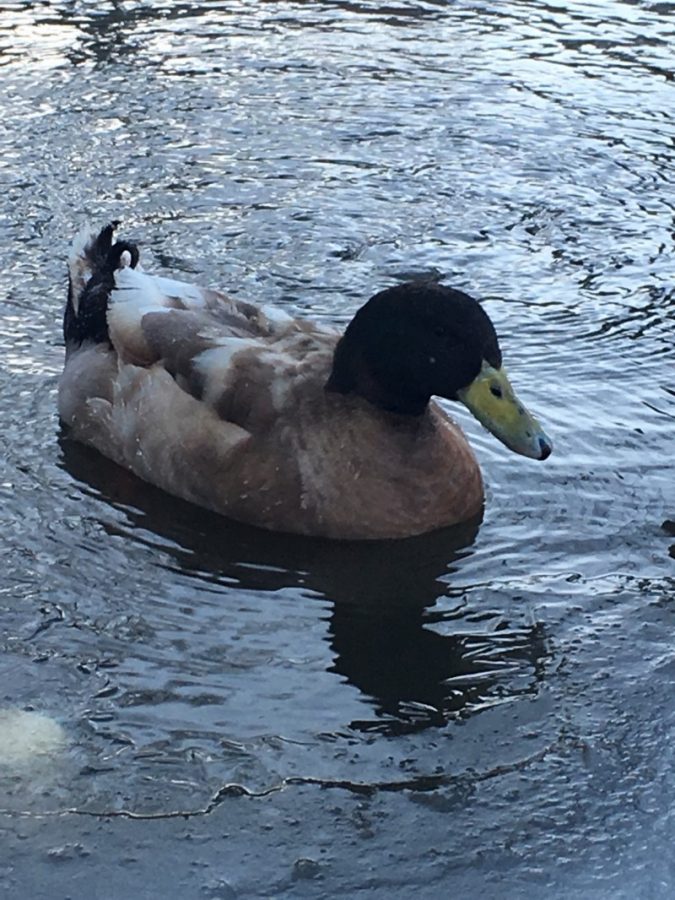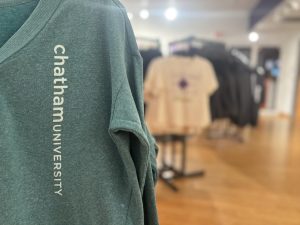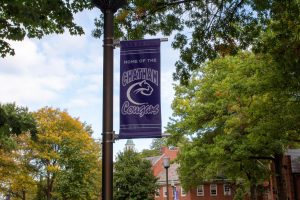Chatham University mourns the death of Howard the duck
November 18, 2020
The Chatham pond is empty.
As winter approaches, the wild ducks have left for the warmth of the South as they always have. But a well-known Chatham University resident, who has stayed at the Shadyside campus pond year round, is gone from his home.
Howard, a domesticated duck who was left by his previous owners on the shore of Chatham’s pond in spring 2018, and his duckling, Puddles, fell prey to Chatham wildlife.
The Monday before Chatham shutdown due to COVID-19, John Sylvester, a member of the grounds team, took his usual trip with the orange Kubota tractor to the Chatham pond to feed the ducks, as he did every weekday morning.
“I always found it to be relaxing to visit with them,” he said.
He would routinely stay with them for half an hour, depending on how busy the day was, but something was off that day. Howard wasn’t there to greet Sylvester.
“Sometimes they would hide, [but] once I would make enough noise with the Kubota, anytime I would show up, they would come running,” Sylvester said.
Sylvester called Kristen Spirl, Chatham’s grounds department manager, when he couldn’t find Howard. Together, they searched for the duck.
Howard “was nowhere to be found,” Sylvester said. “We kind of put two and two together. It was a sad day here at Chatham for us to be sure.”
After only managing to find a few feathers, they believed that he must have become prey to a raccoon, opossum, fox or any of the other wildlife from campus. Two weeks later, Puddles went missing under the same circumstances.
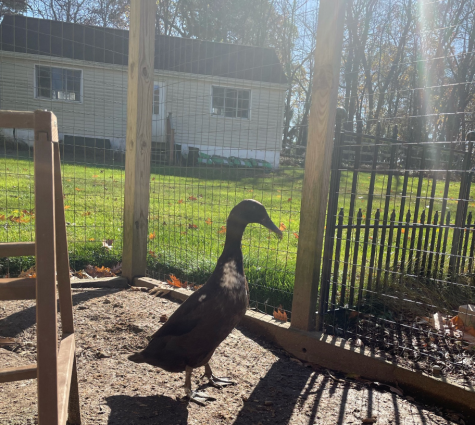
While the University was shut down last spring due to COVID-19, Spirl learned of Howard’s origins. Spirl told the Communique in a past interview that she believed the duck was left by a family who planned to eat him but then decided that they couldn’t go through with it.
While tending to the wild ducks, Spirl met a Chatham student who told her a different story. Allegedly, this student was the roommate of the person who brought a duck to Chatham and kept him in Woodland Hall.
“She told me that she came home … and opened up her shared bathroom with her roommate and, lo and behold, there was a duck in there,” Spirl said.
The duck was allegedly left by the student at the pond with the other birds there, but this duck didn’t resemble his wild counterparts.
“One of my team members of the grounds department took a picture and was like, ‘This is not what normal ducks look like,’” Spirl said. “So, we googled it and found out that he was a domestic duck and found out that he was a male”
They affectionately named him Howard, after the duck in the 1986 movie “Howard the Duck.”
Howard was a Khaki Campbell duck that because of his heavier frame could not fly, like other domesticated ducks. When winter came, Howard stayed at Chatham while the other wild mallard ducks left.
In summer 2019, Howard fathered 19 eggs with Roberta, a Chocolate Indian Runner, who Spirl affectionately calls Robbi. Roberta was named after Chatham’s AVP of Facilities, Robert DuBray. Roberta was allegedly left by a family as a pet because they had no idea how to care for her. Only one of Howard and Roberta’s eggs survived, a duckling named Puddles.
A heated-floating duck house was added to the pond where the eggs were laid, and the ducks enjoyed sleeping.
After both Howard and Puddles were gone, the last domesticated duck at Chatham was Roberta. One of the professors at Chatham University had contact with Hope Haven animal farm, a nonprofit farm sanctuary and animal rescue in Sewickley.
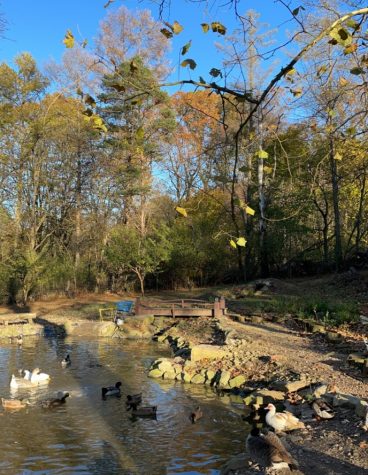
The student gardeners, the grounds team and two electricians worked together to catch Roberta to take her to her new home. “It was crazy,” Sylvester said about trying to corner Roberta. “She was pretty fast. … It was funny after, but it was a tough job.”
Roberta now lives at the Hope Haven with many other ducks. Karen Phillips, Hope Haven’s founder, reports that Roberta is doing great and seems to have adjusted well to her new home. She now has a beautiful dark plumage after molting for the fall.
She made friends with Puff, a female white-crested duck. Both Roberta and Puff were moved to a separate coop for the cold weather months at Phillips’ house but will return to the pond at the animal sanctuary with the warmer spring weather.
Spirl believes there’s a lesson to be learned from this situation. She loved the ducks and gave them the best care she could. However, she insists that people should not get a pet without knowing the care it entails. She asks that ducks not be left at Chatham because there are wild ducks that visit. If a pet cannot be given its proper care, it should go to a place that can take care of it, like a sanctuary.
Although it may look like a duck and quack like a duck, that doesn’t mean it’s a duck that should be left in the wild.


